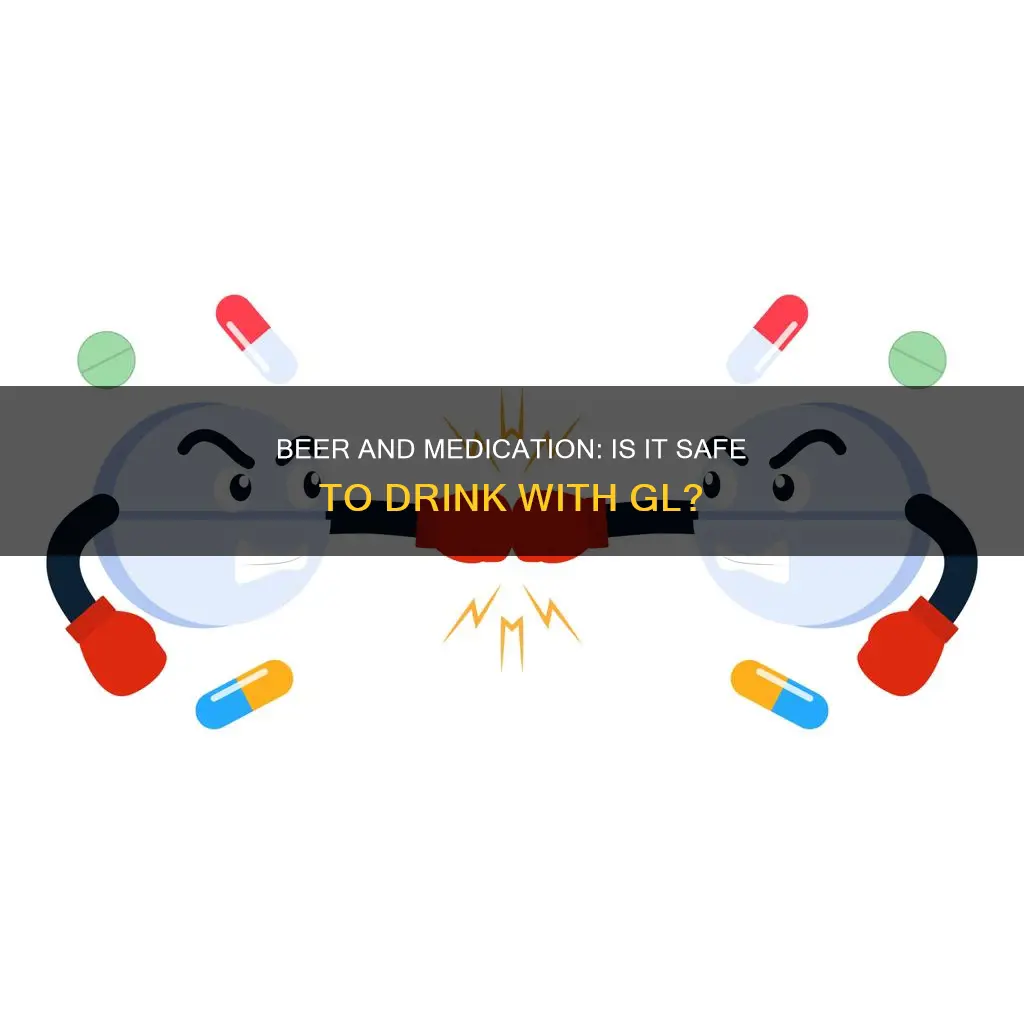
Alcohol and medication can be a dangerous mix. Drinking alcohol while taking medication may increase the risk of unsafe side effects. Beer is a drink made by fermenting sugars from starches, and its major components are barley, hops, water, and yeast. It can be alcoholic or non-alcoholic. While non-alcoholic beer is generally considered safe for most people, alcoholic beer is only deemed safe for most adults when consumed in moderation. However, drinking alcoholic beer in higher amounts can lead to serious health problems, including dependence, liver issues, and certain types of cancer.
When it comes to specific medications, it is crucial to exercise caution. For example, combining alcohol with antibiotics can increase the likelihood of experiencing certain side effects, and it is typically recommended to avoid alcohol while taking certain drugs, such as metronidazole, tinidazole, cefoperazone, cefotetan, and ketoconazole. Additionally, disulfiram (Antabuse), a medication used to treat alcohol use disorder, interacts with alcohol, leading to severe discomfort and adverse effects.
Therefore, it is essential to consult with a healthcare professional or refer to the warning labels on medications to determine if it is safe to consume alcohol while taking specific drugs.
What You'll Learn

Beer and medication can be a dangerous combination
Mixing beer and medication can have serious health consequences, and in some cases, it can even be deadly. Beer, like alcohol in general, can interact with many medications, and these interactions can be harmful. The effects of mixing medication and alcohol can range from increased side effects to potentially life-threatening symptoms, overdose, and even death.
Alcohol can change how a medication works. It can interfere with how medications are absorbed in the digestive tract, making them less effective or even useless. In some cases, alcohol increases the bioavailability of a drug, which can raise the concentration of the medication in the blood to toxic levels.
Drinking alcohol can also worsen the side effects of a medication or cause new symptoms. This is especially true if the medication causes sleepiness or sedation. More intense side effects mean that you might be more impaired after just one drink than you would typically be.
Additionally, alcohol can make it harder for your body to break down and absorb medications, affecting the speed at which they are broken down inside you. In some cases, this can increase the effect of the medicine, while in others, it can decrease it.
Medications that interact with alcohol
The following types of medications are known to interact negatively with alcohol:
- Allergy, cold, and flu medicines
- Antibiotics and antifungals
- Anxiety and epilepsy medications
- Attention and concentration drugs
- Blood pressure medications
- Cholesterol-lowering medications
- Diabetes medications
- Pain medications
- Sleeping pills
- Muscle relaxants
- Narcotic pain medications
- Antidepressants
- Herbal sleep remedies
- Herbal preparations
How to know if it's safe to drink alcohol with your medication
If you are taking any medication, it is important to consult your doctor or pharmacist about whether it is safe to drink alcohol. They can provide personalized guidance based on your specific medications and health status. Be honest about your drinking habits so that your doctor can accurately judge the risks and benefits of prescribing a particular medication.
It is also important to read the labels on your medications and follow any warnings about mixing them with alcohol. Remember that even if there is no specific warning, it does not necessarily mean that it is safe to mix the two.
In general, it is best to err on the side of caution and avoid drinking alcohol while taking medication.
Beer as a Hair Conditioner: Does it Work?
You may want to see also

Antabuse/Disulfiram and beer can cause severe discomfort
Antabuse/Disulfiram is a medication used to treat alcohol use disorder. It works by blocking the body's ability to metabolise alcohol, causing a buildup of toxins in the body, which leads to very unpleasant side effects when combined with alcohol. These side effects can occur even with small amounts of alcohol and can be severe or life-threatening.
When someone taking Antabuse/Disulfiram consumes alcohol, they will experience a range of unpleasant physical reactions known as the Disulfiram-alcohol reaction or "Disulfiram-like reaction". This reaction can start within about 10 to 30 minutes of drinking alcohol and can last for several hours. The severity of the reaction depends on the dosage of Antabuse/Disulfiram and the amount of alcohol consumed.
The most common symptoms of the Disulfiram-alcohol reaction include facial flushing, increased perspiration, nausea, vomiting, and increased heart rate. However, more severe reactions can occur, including respiratory depression, cardiovascular collapse, myocardial infarction (heart attack), acute congestive heart failure, unconsciousness, arrhythmias, convulsions, and even death.
Due to these potentially dangerous reactions, Antabuse/Disulfiram is only prescribed to people who are determined to stay off alcohol. It is important to note that even "non-alcoholic" or "alcohol-free" beers and wines can contain small amounts of alcohol and may produce a Disulfiram-alcohol reaction if consumed in large enough quantities. Therefore, it is advised to avoid all alcoholic beverages, including beer, while taking Antabuse/Disulfiram.
Hoppy Beers: The Secret to Better Beer Bread?
You may want to see also

Alcohol can interfere with antibiotic absorption
While mixing moderate amounts of alcohol with antibiotics will not usually lower the effectiveness of the antibiotic, drinking alcohol while sick can cause dehydration, an upset stomach, interrupt normal sleep, and lower your immune response, hindering your body's natural ability to heal itself. Alcohol can also worsen the side effects of antibiotics, such as nausea, dizziness, drowsiness, and vomiting.
Alcohol can also affect how some antibiotics are metabolised in the body. This could lower the effectiveness of the antibiotic or increase its toxicity. For example, alcohol may delay the absorption of erythromycin ethylsuccinate into the bloodstream, reducing its antibiotic effect. Similarly, alcohol can decrease the level of doxycycline in the body by increasing its elimination from the body.
Some antibiotics can cause violent physical reactions when mixed with alcohol. These include Metronidazole and Linezolid, which are commonly prescribed to treat intestinal tract and skin infections, and the sulfonamide medications of Sulfamethoxazole and Trimethoprim, which are used to treat everything from urinary tract infections to pneumonia to ear infections. Consuming alcohol while taking these drugs can result in severe fatigue, a throbbing headache, dizziness, anxiety, chest pain, and heart palpitations.
Therefore, it is recommended to avoid drinking alcohol while taking antibiotics.
The Magic of Beer Thieves: How Do They Work?
You may want to see also

Alcohol can worsen side effects of some medications
Alcohol can have harmful interactions with prescription medications, over-the-counter drugs, and even some herbal remedies. Alcohol can worsen the side effects of some medications, such as sleepiness, drowsiness, and light-headedness, which may interfere with your concentration and ability to operate machinery or drive a vehicle. It is important to observe warning labels and ask your doctor or pharmacist if it is safe to use alcohol with any medications and herbal remedies that you take.
- Antibiotics: Alcohol doesn't make most antibiotics less effective, but consuming alcohol might increase your chance of experiencing certain side effects. For example, drinking alcohol while taking metronidazole or tinidazole can cause side effects such as nausea, vomiting, sweating, headache, and an increased heartbeat.
- Painkillers: Alcohol can increase the risk of gastrointestinal bleeding when combined with nonsteroidal anti-inflammatory drugs (NSAIDs), including ibuprofen, naproxen, and aspirin. It can also cause liver damage when combined with acetaminophen (paracetamol).
- Heart medications: Alcohol can cause rapid heartbeat and sudden changes in blood pressure when combined with heart medications such as verapamil and propranolol.
- Sleep medications: Alcohol can increase the side effects of sleep medications, such as impaired breathing, drowsiness, motor control, and unusual behavior.
- Antidepressants: Alcohol may increase the side effects of antidepressants, such as drowsiness and dizziness. It may also reduce the effectiveness of antidepressants and increase the risk of suicide.
- Opioids: Alcohol can increase the risk of overdose and respiratory depression when combined with opioids.
Beer and Painkillers: How Does Ibu Work?
You may want to see also

Alcohol can increase the risk of bleeding when taking blood thinners
Blood thinners are drugs that prevent blood clots from forming. Doctors may advise people taking these medications to moderate their alcohol intake. This is because alcohol can increase the risk of bleeding when taken with blood thinners. Both alcohol and blood thinners affect how well your blood clots. Alcohol can also affect how long it takes for someone to stop bleeding.
There are two types of blood thinners: anticoagulants and antiplatelet drugs. Anticoagulants, such as warfarin, prevent your blood from clotting. Antiplatelet drugs, such as aspirin, prevent platelets (a type of blood cell) from sticking together and forming clots. Both types of medications can increase the risk of bleeding if you drink alcohol while taking them.
For example, people taking warfarin or drugs containing acetylsalicylic acid (aspirin) should limit their alcohol intake. A study found that moderate-to-high alcohol use while taking warfarin can lead to major bleeding. Heavy drinking while taking Aggrenox, an anticoagulant, increases the risk of stomach bleeding.
It is important to speak with your healthcare provider before drinking alcohol while taking blood thinners. If you drink alcohol while taking blood thinners, monitor yourself for signs of bleeding, such as easy bruising or bleeding from cuts that take longer than usual to stop. Other signs of bleeding include heavier menstrual bleeding than usual, tar-like or red stools, bleeding gums, and nosebleeds that don't stop.
While moderate alcohol consumption is generally safe for most people taking blood thinners, it is never a good idea to drink while on these medications. People who are unable to control how much they drink should completely avoid alcohol while on blood thinners. Always consult a doctor or pharmacist before drinking alcohol with any new medication.
Centrifugal Force: Spinning Beer to Perfection
You may want to see also







